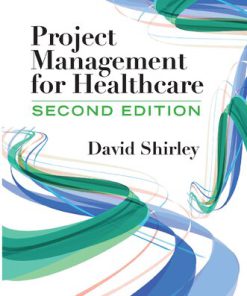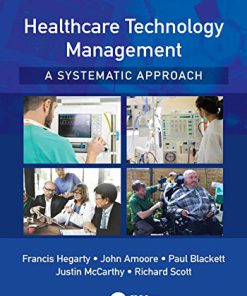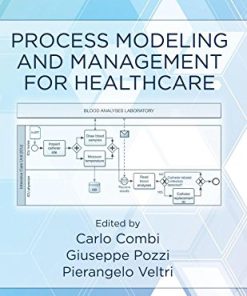Elgar Encyclopedia of Healthcare Management 1st Edition by Federico Lega 1800889453 9781800889453
$50.00 Original price was: $50.00.$25.00Current price is: $25.00.
Elgar Encyclopedia of Healthcare Management 1st Edition by Federico Lega – Ebook PDF Instant Download/DeliveryISBN: 1800889453, 9781800889453
Full download Elgar Encyclopedia of Healthcare Management 1st Edition after payment.

Product details:
ISBN-10 : 1800889453
ISBN-13 : 9781800889453
Author: Federico Lega
Management practices within the healthcare sector are shaped by a multitude of professional, social, political and technical factors. This Elgar Encyclopedia of Healthcare Management provides insights and definitions on essential themes that clarify complexity and specificity of leading within the health sector, as well as the latest trends in health policy that affects management practices. Its structure is built on the current agenda of health managers and health management scholars and it offers a broad look into new challenges and principles that are re-shaping managerial dynamics of the health sector and the way the health services should be designed and delivered. Key Features: ・117 accessible entries organized by theme ・An up-to-date examination of emerging healthcare paradigms ・Over 50 leading contributors from a variety of backgrounds and specialisms ・A balanced subject range aimed at improving the proficiencies of healthcare leaders, across technical skills and management practices This authoritative work will be incredibly useful for students and scholars of healthcare management, policy and economics.
Elgar Encyclopedia of Healthcare Management 1st table of contents:
Part I Scenarios
1. Big data and artificial intelligence
2. Disruptive technology innovations
3. Genomics
4. Globalization
5. Medical tourism
6. Precision medicine
7. Robotics
Part II Basic models of health systems
8. Beveridge model
9. Bismarck model
10. Market-driven model
Part III Evolution of the pharma and medtech industry
11. Market access
12. Digital therapeutics
13. Biotech
Part IV Foundations of health economics
14. Baumol’s cost disease
15. Disease mongering
16. Moral hazard in health insurance
17. Quasi-markets
18. Supplier-induced demand
Part V Funding
19. Payment mechanisms
20. Sources of funding
21. Tariff vs price
Part VI Health policy principles
22. Equality and equity
23. Universalism
24. Well-being
Part VII Investment analysis
25. Business planning of healthcare services
26. Sources of funding for investments
Part VIII Levels of care
27. Acute, sub-acute and post-acute care
28. Chronic care
29. Home care and community care
30. Hospital
31. Long term care
32. Prevention
33. Screenings
34. Primary healthcare
35. Secondary vs tertiary vs quaternary care
Part IX New paradigms
36. Access to healthcare
37. Co-production
38. Demedicalization
39. Evidence-based medicine
40. From compliance to concordance
41. Gender medicine
42. Global health
43. Health literacy
44. Initiative medicine
45. Integrated care
46. Population health management
47. Skill mix and task shifting in healthcare
48. Value-based vs volume-based healthcare
Part X Players
49. Boundaryless hospital
50. Community and country hospital
51. Intermediate and transitional care settings
52. Primary care center
53. Research hospital
54. Teaching hospital
Part XI Trends
55. Business models
56. Decentralization and devolution in healthcare
57. Multidisciplinarity and inter-professionality
58. Telemedicine
59. Vertical and horizontal integration (hub and spoke network)
Part XII Behaviours: challenges to leading health organizations
60. Accountability
61. Accountable care plan and organization
62. Iatrocracy, professional bureaucracy and corporatization
63. Political arena
64. Professional vs managerial culture
65. Professionalism
66. Stakeholder management
67. Teamwork
68. Turf wars
Part XIII Practices
69. Change management
70. Disaster management
71. Leadership and leadership styles
Part XIV Roles
72. Case manager
73. Clinical engineer
74. Clinical leader
75. Controller
76. Family and community nurse
77. General practitioner
78. Hospitalist
79. Medical director
80. Operations manager
81. Pharmacist
82. Quality and risk manager
Part XV Tools system and process: disease management
83. Clinical governance
84. Guidelines and protocols in healthcare systems
Part XVI Innovation management
85. Clinical trial
86. Health technology assessment
Part XVII Operations
87. Electronic clinical records
88. Patient flow logistics
89. Patient management
90. Supply chain
91. Techniques for process and organizations improvement: lean management in healthcare
Part XVIII Organization
92. Clinical service lines
93. Converging trends in hospital transformation
94. Divisionalization, clinical directorates and Troika model in healthcare
95. Organizational culture
96. Organizational design and development for healthcare organizations
97. Patient-centered hospital and health organization
Part XIX People
98. Clinical and professional engagement
99. Great Place to Work
100. Magnet hospital
Part XX Performance
101. Balanced scorecard in healthcare organizations
102. Budgeting (financial vs operational)
103. Customer satisfaction
104. DRG and case mix index
105. Length of stay
106. Performance measurement and management systems
107. PROMs and PREMs
108. Strategic control
Part XXI Planning
109. Strategic planning
110. Strategy making
Part XXII Procurement
111. Centralized procurement
112. Innovation procurement
113. Managed entry agreements (MEA)
114. Value-based procurement
Part XXIII Quality
115. Accreditation in healthcare
116. Audit
117. Quality management
People also search for Elgar Encyclopedia of Healthcare Management 1st:
encyclopedia of health care management
elgar encyclopedia
encyclopedia of elder
elgar encyclopedia of comparative law
electronic health management system
Tags: Elgar Encyclopedia, Healthcare Management, Federico Lega
You may also like…
Business & Economics - Project Management
Project Management for Healthcare, Second Edition David Shirley
Business & Economics
Personal finance an encyclopedia of modern money management Friedberg
Politics & Philosophy - Politics
The Elgar Companion to Antonio Gramsci 1st Edition William K Carroll
Business & Economics - Management & Leadership
History - European History












